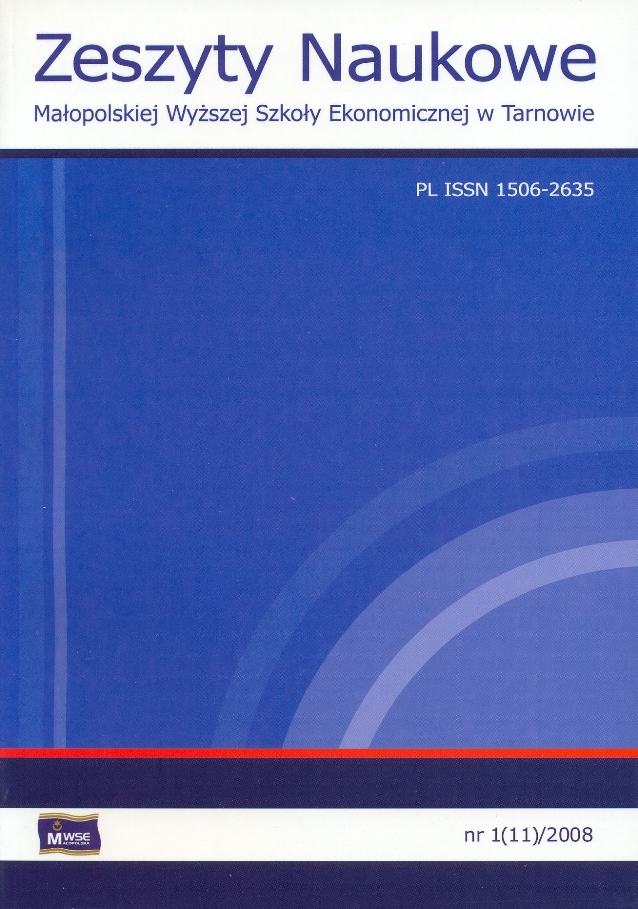Abstract
Development scenarios of rural areas result from their diversification as well as the degree of inhabitants’ enterprise. The diversification is the result of history, relations between “the centre and the outskirts”, “the pension of the location”, the effects of work of local authorities as well as the inhabitants’ union. Moreover, enterprise as a specific element of the ability of undertaking actions, which turn into tangible solutions and economic enterprises influence an economic development. The participation of rural areas in the area of Poland and the fact that they are inhabited by 38% of the population, conditions the role of the space as the area in which two basic economic functions come together: agriculture and forestry, which are based on the usage of the space. Spatial differentiation results from the effects of internal and external factors, influencing the scenarios of development of rural areas in particular small regions. The majority of authors examining the problem of the development of rural areas emphasizes the significance of spatial conditions and special local features, while choosing the direction of development of a given region. Significant issues in this development are natural as well as social and economic conditions, which can be propitious to the creation of new employment and non-agricultural sources of income and simultaneously affect higher standard of living of inhabitants. Such level in the face of economy’s globalization can only be achieved through sustainable development. The work presents original and earlier unpublished scenarios of sustainable development of rural areas. These scenarios are based on the results of the analysis, which constitute a synthesis of theoretical suggestions and individual assumptions of the authors.
References
Czaja S., Hałasa J.M., Rumianowska I. 1997. Realizacja strategii ekorozwoju na poziomie społeczności lokalnej. Kraków: Europejskie Stowarzyszenie Ekonomistów Środowiska i Zasobów Naturalnych. Biblioteka Ekonomia i Środowisko nr 22, s. 33–45.
View in Google Scholar
Fiedor B. (red.). 2002. Podstawy ekonomii środowiska i zasobów naturalnych. Warszawa: C.H. Beck. ISBN 83-7110-868-0.
View in Google Scholar
Fiedor B. 2004, Polska polityka rolna w kontekście przejścia od tradycyjnej polityki rolnej (CAP) do polityki zintegrowanego rozwoju wsi i rolnictwa w Unii Europejskiej (CARP). W: Ekologiczny wymiar integracji Polski z Unią Europejską. Lądek Zdrój: I-BIS, Biblioteka Ekonomia i Środowisko nr 31. ISBN 83-85773-68-1, s. 57–69.
View in Google Scholar
Koreleski D. 2001. Wiejskie obszary problemowe województwa małopolskiego w kontekście integracji z Unią Europejską. Dysertacja doktorska, maszynopis, AE Kraków.
View in Google Scholar
Krakowiak-Bal A. 2005. Infrastruktura techniczna wiejskich gmin górskich w aspekcie ich wielofunkcyjnego rozwoju. W: Infrastruktura i ekologia terenów wiejskich. Seria: Rozprawy nr 3. Kraków: Komisja Technicznej Infrastruktury Terenów Wiejskich PAN. ISBN
View in Google Scholar
Łojewski S., Iwicki S. 1999. Kierunki wielofunkcyjnego rozwoju obszarów wiejskich na przykładzie regionu kujawsko-pomorskiego. Bydgoszcz: Wyd. ATR. ISBN 83-87274-86-0.
View in Google Scholar
Pajda R. 1997. Warunki wdrażania ekorozwoju w układzie gmin. Kraków: Europejskie Stowarzyszenie Ekonomistów Środowiska i Zasobów Naturalnych. Biblioteka Ekonomia i Środowisko nr 22, s. 46–52.
View in Google Scholar
Parysek J.J. 2001. Podstawy gospodarki lokalnej. Poznań: Wyd. UAM. ISBN 83-232-0796-8.
View in Google Scholar
Piontek B. (red.). 2002. Koncepcja rozwoju zrównoważonego i trwałego Polski. Warszawa: Wydawnictwo Naukowe PWN. ISBN 83-01-13787-8.
View in Google Scholar
Rosner A. 2005. Uwarunkowania i kierunki przemian społeczno-gospodarczych na obszarach wiejskich. Warszawa: Wyd. IRWiR PAN. ISBN 83-89900-00-9.
View in Google Scholar
Siekierski J. 2002. Rolnictwo i wieś polska wobec współczesnych wyzwań rozwojowych i integracyjnych. Tarnów: Wyd. Małopolskiej Wyższej Szkoły Ekonomicznej. ISBN 83-0917312-0-0.
View in Google Scholar
Siekierski J. 2004. Rola liderów wiejskich w absorpcji finansowych środków unijnych dla rozwoju rolnictwa o obszarów wiejskich. W: Pałasz L. (red.). Wpływ integracji europejskiej na przemiany strukturalne obszarów o wysokim bezrobociu. Szczecin: Wyd. Akademii Rolniczej. ISBN 83-921234-0-9.
View in Google Scholar
Wojewodzic T. 2002. Ocena poziomu rozwoju społeczno-gospodarczego gmin województwa małopolskiego. „Prace Naukowe AE we Wrocławiu: Agrobiznes” 941, s. 483–487.
View in Google Scholar
Wojewodzic T., Popławski Ł. 2006. Przestrzenne zróżnicowanie gmin wiejskich w województwie świętokrzyskim ze względu na poziom zrównoważenia rozwoju. Referat przygotowany na konferencję jubileuszową 60-lecia Prof. B. Fiedora.
View in Google Scholar
Zawisza S., Pilarska S. 2003. Liderzy wiejskich społeczności lokalnych. „Zagadnienia Doradztwa Rolniczego” nr 1/2, 2003 (34), Krajowe Centrum Doradztwa Rozwoju Rolnictwa i Obszarów Wiejskich, s. 55–68.
View in Google Scholar
Żmija J. 2003. Przedsiębiorczość na obszarach wiejskich. W: Przedsiębiorstwo i rynek pod red. M. Łaguna. Olsztyn: Wyd. UWM. ISBN 83-89112-70-1, s. 11–24.
View in Google Scholar
© Copyright by Małopolska School of Economics in Tarnów. The articles are available under the Creative Commons Attribution NonCommercial-NoDerivatives 4.0 International License


